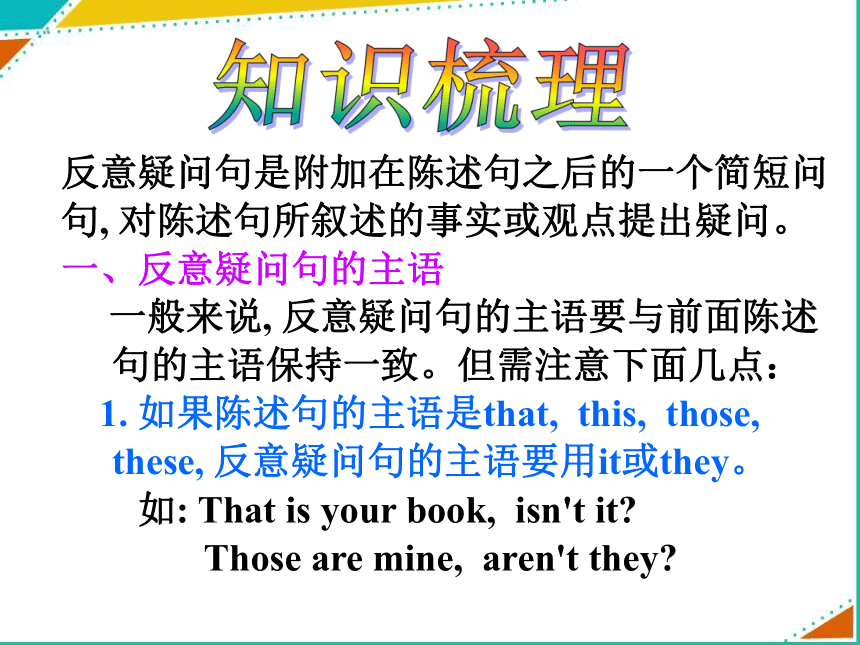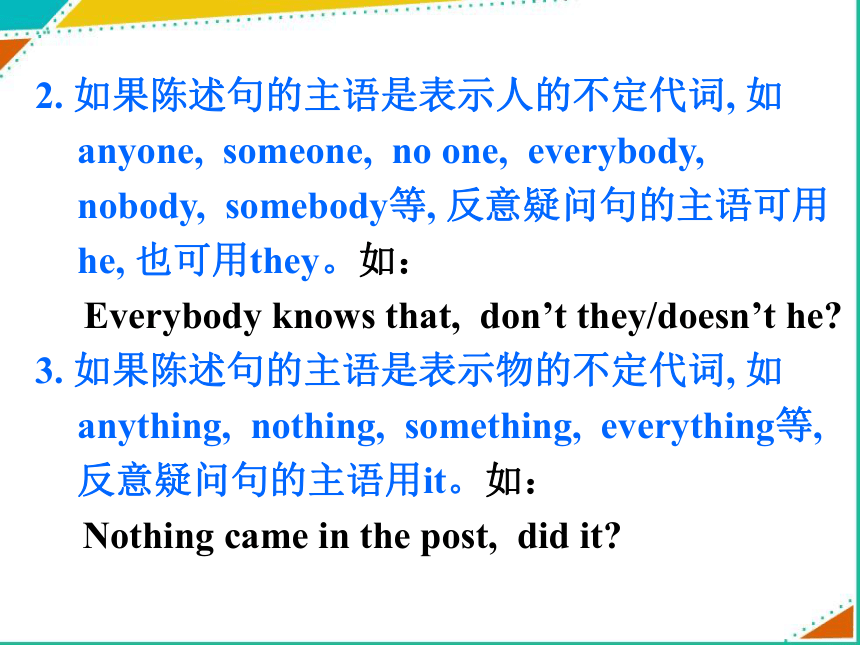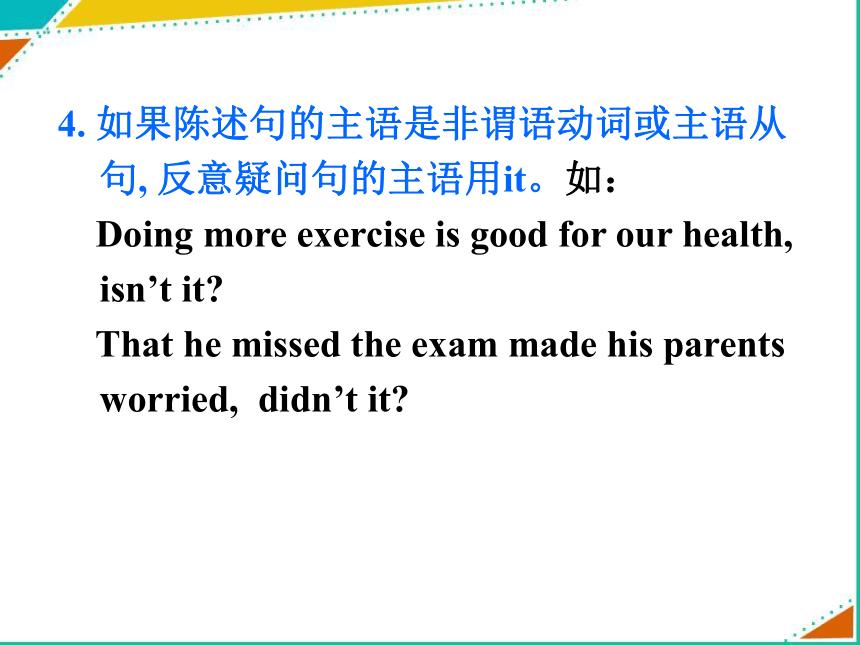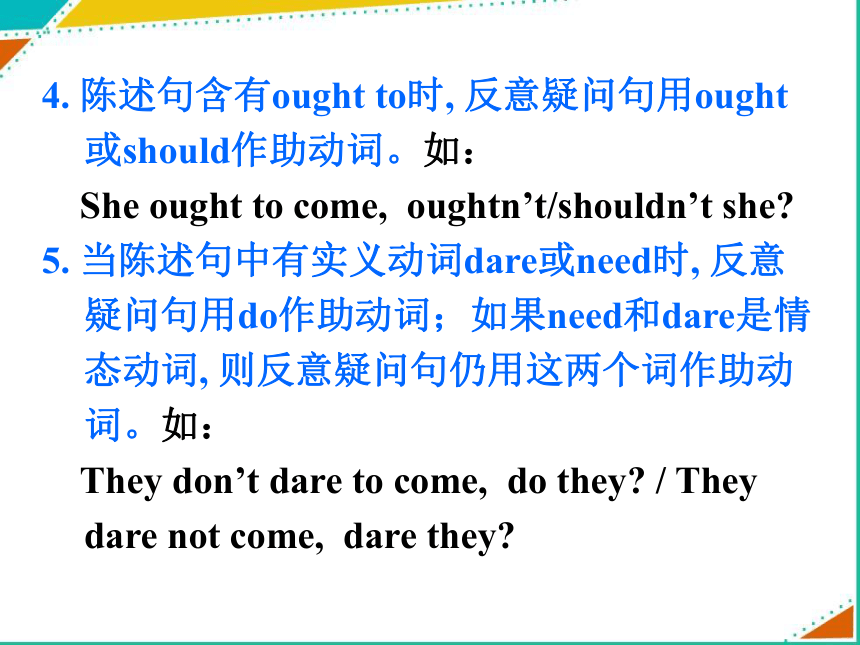2017年高考二轮语法专题课件:反意疑问句
文档属性
| 名称 | 2017年高考二轮语法专题课件:反意疑问句 |  | |
| 格式 | zip | ||
| 文件大小 | 210.0KB | ||
| 资源类型 | 教案 | ||
| 版本资源 | 通用版 | ||
| 科目 | 英语 | ||
| 更新时间 | 2017-01-18 11:11:44 | ||
图片预览







文档简介
课件18张PPT。反意疑问句知识梳理反意疑问句是附加在陈述句之后的一个简短问
句, 对陈述句所叙述的事实或观点提出疑问。
一、反意疑问句的主语
一般来说, 反意疑问句的主语要与前面陈述句的主语保持一致。但需注意下面几点:
1.?如果陈述句的主语是that, this, those, these, 反意疑问句的主语要用it或they。
如: That is your book, isn't it?
Those are mine, aren't they?2.?如果陈述句的主语是表示人的不定代词, 如anyone, someone, no one, everybody, nobody, somebody等, 反意疑问句的主语可用he, 也可用they。如:
Everybody knows that, don’t they/doesn’t he?
3.?如果陈述句的主语是表示物的不定代词, 如anything, nothing, something, everything等, 反意疑问句的主语用it。如:
Nothing came in the post, did it?4.?如果陈述句的主语是非谓语动词或主语从句, 反意疑问句的主语用it。如:
Doing more exercise is good for our health, isn’t it?
That he missed the exam made his parents worried, didn’t it?5. Let’s与Let us / me后的反意疑问句的主语不同。如:
Let’s go for a walk, shall we?
Let us / me go home, will you?
6.?陈述句如果是there be句型, 反意疑问句的主语用there。如:
There is a pen on the desk, isn’t there?二、反意疑问句的助动词
反意疑问句的助动词要与陈述句的助动词保
持一致。
1.?在含I am的陈述句之后, 反意疑问句的助动词用aren’t。
2.?陈述句的谓语动词为have to时, 反意疑问句用do作助动词。
3.?陈述句的谓语动词含有used to时, 反意疑问句可用use(d)或did作助动词。如:
She used to come and help you, use(d)n’t / didn’t she?4.?陈述句含有ought to时, 反意疑问句用ought或should作助动词。如:
She ought to come, oughtn’t/shouldn’t she?
5.?当陈述句中有实义动词dare或need时, 反意疑问句用do作助动词;如果need和dare是情态动词, 则反意疑问句仍用这两个词作助动词。如:
They don’t dare to come, do they? / They dare not come, dare they?6.?陈述句有情态动词must时, 反意疑问句中除了可使用must的适当形式外, 还有其它情况:
1) must意为“一定, 准是”时, 反意疑问句中的助动词可与must后面的动词相照应。但是当陈述句谓语是must have done, 且句中有明确的表示过去的时间状语时, 反意疑问句用did作助动词。如:
She must be a student, isn’t she? You must have misheard, haven’t you??
(没有表示过去的时间状语)
It must have rained last night, didn’t it??
(带有表示过去的时间状语)
2) must意为“必须”时, 反意疑问句中的助动词可用needn’t。如:
They must hand in their papers today, needn’t they?
3) mustn’t意为“禁止”时, 反意疑问句中的助动词可用may。如:
The children mustn’t play in the street, may they?三、反意疑问句用肯定还是否定
陈述句是肯定句, 反意疑问句用否定式;陈述句是否定句, 反意疑问句用肯定式。如果陈述句含有表示否定或半否定意义的单词, 如not, no, never, none, little, seldom, hardly, few, nowhere, nothing等, 这个句子被看成否定句, 反意疑问句用肯定式。如:
He never comes to school so late, does he?四、陈述句是主从复合句或其它句子时的反意
疑问句
1.?陈述句是主从复合句时, 反意疑问句通常与主句保持一致。但主句中如果有I think / believe / suppose?等时, 反意疑问句应与其宾语从句保持一致。如:
I don’t think he is right, is he?
2.?陈述句是并列句时, 反意疑问句与后一个分句保持一致。如:
I bought you a ticket yesterday, and you went to see the film with me, didn’t you?3.?感叹句的反意疑问句通常用否定式, 助动词一般用be。如:
What a cold day, isn’t it?
4.?祈使句的反意疑问句通常用will作助动词。祈使句为肯定句时, 反意疑问句常用will / won’t / can / can’t you;祈使句为否定句, 反意疑问句则常用will you或can you。如:
Open the door, will/won’t/can/can’t you?
Don’t go out, will / can you?高考链接从A、B、C、D四个选项中, 选出可以填入空白处的最佳选项。
1. —I spent two weeks in London last summer.
—Then you must have visited the British
Museum during your stay, _____ you? (重
庆2014)
A. mustn’t??? ??????????????????B. haven’t???
C. didn’t????? ?????????????????? D. hadn’t2. There is little doubt in your mind that he is
innocent, _____??? (江苏2012)
A. is there??? ????? ????????? B. isn’t there
C. is he?? ????? ????????????? D. isn’t he??
3. It doesn’t matter if they want to come to your
party, _____?? (上海2011)
A. doesn’t it ?? ??? ?? ???????? B. does it??
C. don’t they ? ???? ?????????? D. do they
4. I told them not everybody could run as fast as
you did, _____?? (重庆2011)
A. could he ? ? ? ? ???????????? B. didn’t I??
C. didn’t you ? ? ? ? ? ??????? D. could they(W = William, N = Nicole)
W: It’s Saturday today, 1. ________?
N: Yes, it is.
W: Turn the TV on, won’t you?
N: You can turn it on yourself, 2. _________?
W: Don’t be so mean! You’re never nice to
me, 3. ________? 用反意疑问句补全下面对话。isn’t it? ??? can’t you巩固练习?are you ? ?? N: You’re so lazy. You know that, don’t you? You can see I’m busy, 4. _________?
W: Busy! I don’t call reading a stupid magazine busy. Anyway, you’ve read it before, 5. ___________?
N: That’s none of your business, 6. _____? I can read what I like when I like, can’t I?
W: All right I’ll turn the TV on. Pass me the remote control, 7. ____________________?can’t you?? haven’t youis it?? will/won’t/can/can’t youN: You’re not going to watch “EastEnders”, 8. ________? I can’t stand it.
W: You do what you want to do and I’ll do what I want, then we’ll both be happy, 9. _________?
N: Why don’t you watch it in the bedroom, then you won’t disturb me?
W: I’ve had enough of you. Don’t expect me back until closing time. Goodbye.
?are youwon’t we
句, 对陈述句所叙述的事实或观点提出疑问。
一、反意疑问句的主语
一般来说, 反意疑问句的主语要与前面陈述句的主语保持一致。但需注意下面几点:
1.?如果陈述句的主语是that, this, those, these, 反意疑问句的主语要用it或they。
如: That is your book, isn't it?
Those are mine, aren't they?2.?如果陈述句的主语是表示人的不定代词, 如anyone, someone, no one, everybody, nobody, somebody等, 反意疑问句的主语可用he, 也可用they。如:
Everybody knows that, don’t they/doesn’t he?
3.?如果陈述句的主语是表示物的不定代词, 如anything, nothing, something, everything等, 反意疑问句的主语用it。如:
Nothing came in the post, did it?4.?如果陈述句的主语是非谓语动词或主语从句, 反意疑问句的主语用it。如:
Doing more exercise is good for our health, isn’t it?
That he missed the exam made his parents worried, didn’t it?5. Let’s与Let us / me后的反意疑问句的主语不同。如:
Let’s go for a walk, shall we?
Let us / me go home, will you?
6.?陈述句如果是there be句型, 反意疑问句的主语用there。如:
There is a pen on the desk, isn’t there?二、反意疑问句的助动词
反意疑问句的助动词要与陈述句的助动词保
持一致。
1.?在含I am的陈述句之后, 反意疑问句的助动词用aren’t。
2.?陈述句的谓语动词为have to时, 反意疑问句用do作助动词。
3.?陈述句的谓语动词含有used to时, 反意疑问句可用use(d)或did作助动词。如:
She used to come and help you, use(d)n’t / didn’t she?4.?陈述句含有ought to时, 反意疑问句用ought或should作助动词。如:
She ought to come, oughtn’t/shouldn’t she?
5.?当陈述句中有实义动词dare或need时, 反意疑问句用do作助动词;如果need和dare是情态动词, 则反意疑问句仍用这两个词作助动词。如:
They don’t dare to come, do they? / They dare not come, dare they?6.?陈述句有情态动词must时, 反意疑问句中除了可使用must的适当形式外, 还有其它情况:
1) must意为“一定, 准是”时, 反意疑问句中的助动词可与must后面的动词相照应。但是当陈述句谓语是must have done, 且句中有明确的表示过去的时间状语时, 反意疑问句用did作助动词。如:
She must be a student, isn’t she? You must have misheard, haven’t you??
(没有表示过去的时间状语)
It must have rained last night, didn’t it??
(带有表示过去的时间状语)
2) must意为“必须”时, 反意疑问句中的助动词可用needn’t。如:
They must hand in their papers today, needn’t they?
3) mustn’t意为“禁止”时, 反意疑问句中的助动词可用may。如:
The children mustn’t play in the street, may they?三、反意疑问句用肯定还是否定
陈述句是肯定句, 反意疑问句用否定式;陈述句是否定句, 反意疑问句用肯定式。如果陈述句含有表示否定或半否定意义的单词, 如not, no, never, none, little, seldom, hardly, few, nowhere, nothing等, 这个句子被看成否定句, 反意疑问句用肯定式。如:
He never comes to school so late, does he?四、陈述句是主从复合句或其它句子时的反意
疑问句
1.?陈述句是主从复合句时, 反意疑问句通常与主句保持一致。但主句中如果有I think / believe / suppose?等时, 反意疑问句应与其宾语从句保持一致。如:
I don’t think he is right, is he?
2.?陈述句是并列句时, 反意疑问句与后一个分句保持一致。如:
I bought you a ticket yesterday, and you went to see the film with me, didn’t you?3.?感叹句的反意疑问句通常用否定式, 助动词一般用be。如:
What a cold day, isn’t it?
4.?祈使句的反意疑问句通常用will作助动词。祈使句为肯定句时, 反意疑问句常用will / won’t / can / can’t you;祈使句为否定句, 反意疑问句则常用will you或can you。如:
Open the door, will/won’t/can/can’t you?
Don’t go out, will / can you?高考链接从A、B、C、D四个选项中, 选出可以填入空白处的最佳选项。
1. —I spent two weeks in London last summer.
—Then you must have visited the British
Museum during your stay, _____ you? (重
庆2014)
A. mustn’t??? ??????????????????B. haven’t???
C. didn’t????? ?????????????????? D. hadn’t2. There is little doubt in your mind that he is
innocent, _____??? (江苏2012)
A. is there??? ????? ????????? B. isn’t there
C. is he?? ????? ????????????? D. isn’t he??
3. It doesn’t matter if they want to come to your
party, _____?? (上海2011)
A. doesn’t it ?? ??? ?? ???????? B. does it??
C. don’t they ? ???? ?????????? D. do they
4. I told them not everybody could run as fast as
you did, _____?? (重庆2011)
A. could he ? ? ? ? ???????????? B. didn’t I??
C. didn’t you ? ? ? ? ? ??????? D. could they(W = William, N = Nicole)
W: It’s Saturday today, 1. ________?
N: Yes, it is.
W: Turn the TV on, won’t you?
N: You can turn it on yourself, 2. _________?
W: Don’t be so mean! You’re never nice to
me, 3. ________? 用反意疑问句补全下面对话。isn’t it? ??? can’t you巩固练习?are you ? ?? N: You’re so lazy. You know that, don’t you? You can see I’m busy, 4. _________?
W: Busy! I don’t call reading a stupid magazine busy. Anyway, you’ve read it before, 5. ___________?
N: That’s none of your business, 6. _____? I can read what I like when I like, can’t I?
W: All right I’ll turn the TV on. Pass me the remote control, 7. ____________________?can’t you?? haven’t youis it?? will/won’t/can/can’t youN: You’re not going to watch “EastEnders”, 8. ________? I can’t stand it.
W: You do what you want to do and I’ll do what I want, then we’ll both be happy, 9. _________?
N: Why don’t you watch it in the bedroom, then you won’t disturb me?
W: I’ve had enough of you. Don’t expect me back until closing time. Goodbye.
?are youwon’t we
